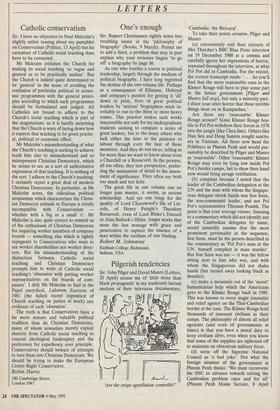One's enough
Sir: Rupert Christiansen rightly notes two troubling issues in the 'philosophy of biography' (Books, 9 March). Permit me to add a third, a problem that may in part explain why your reviewer begins `to go off' a biography by page 86.
As one who teaches a course in political leadership, largely through the medium of political biography, I have long regretted the demise of the one-volume life. Perhaps as a consequence of Ellmann, Holroyd and company's passion for getting it 'all' down in print, lives of great political leaders by 'serious' biographers seem in- evitably to run to the three or more heavy tomes. This practice makes such works inaccessible not only for my undergraduate students seeking to compare a series of great leaders, but to the many others who lack either the time or the patience to labour through even the best of these monsters. And they do run on so, telling us far more than we want to know about even a Churchill or a Roosevelt. In the process, all too often, they lose perspective, prefer- ring the amassment of detail to the assess- ment of significance. They often say both too much and too little.
The great life in one volume can no longer pass muster, it seems, as serious scholarship. And yet one longs for the quality of Lord Charnwood's life of Lin- coln, of Henry Pringle's Theodore Roosevelt, even of Lord Blake's Disraeli or Alan Bullock's Hitler, longer works that none the less manage with grace and penetration to capture the essence of a man within the confines of one binding. Robert M. Johnstone
Earlham College, Richmond, Indiana, USA


















































 Previous page
Previous page